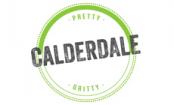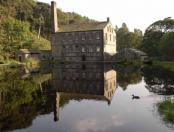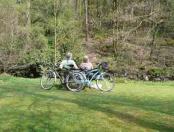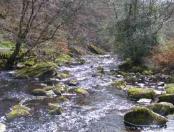Yorkshire
![]()
HARDCASTLE CRAGS
 t: 01422 846236
t: 01422 846236
w: www.visitcalderdale.com/attra-hardcastle-crags
Located north of the market town of Hebden Bridge, Hardcastle Crags offers more than 160 hectares (400 acres) of unspoilt woodland, with tumbling streams, glorious waterfalls, stepping stones across Hebden water, picnic spots and stacks of millstone grit, all crisscrossed by more than 15 miles (24km) of footpaths.



At its heart is Gibson Mill, a family-oriented visitor centre, telling the history of the valley over the past 200 years, with interactive displays, dressing up, dancing and exhibitions. Gibson Mill, with no link to the national grid; is unique in the UK and is the National Trust's flagship sustainable building.
At Gibson Mill you’ll find the Weaving Shed Café, serving delicious ethical and locally-produced food. You can also buy the perfect gift or memento in the shop located there.
The mixed woodland at Hardcastle Crags is managed to encourage natural regeneration of native broadleaved species. Fallen trees and standing deadwood are left to provide habitats for invertebrates, birds and bats.
This ancient semi-natural woodland is a mixture of native broadleaf trees (including oak, birch and alder) and planted areas of beech and pine. A rich variety of plant life can also be seen, with species such as great woodrush, bilberry, bluebell, wood sorrel and climbing corydalis.
Species-rich hay meadows can be found high on the valley sides, close to the Widdop Road. The meadows are cut in late summer after the plants have flowered, allowing the seed to be collected. Types of birds and insects commonly found on meadows include the skylark, twite, meadow pippet, and various types of beetle.
Mill ponds from a past industrial age now provide aquatic habitats for invertebrates, fish, amphibians and birds. The fast flowing streams of Hebden Water and Crimsworth Dean Beck flow through Hardcastle Crags too.
Roe deer are the largest mammals found here and are easily recognised by their characteristic white rumps. The valley is also home to eight species of bat, including pipistrelle, whiskered, natterer's and noctule.
Herons, dippers and wagtails can often be found by the river. Rarer birds such as the green woodpecker, redstart, grey wagtail, bullfinch, willow warbler, wood warbler and song thrush can also be seen around the site.
Many invertebrates are associated with decaying wood, so Hardcastle Crags provides an ideal home for a number of significant species, including fungus beetles, rove beetles, moths and ants. See how many you can find.
Lichens and bryophytes (liverworts, mosses and hornworts) thrive in this area because of the high humidity in the deep valleys. There are also numerous fungi, with over 400 species noted by local naturalists.
Parking
National Trust pay & display car parks are available at Midgehole Road and Clough Hole, Widdop Road. Gibson Mill and the Café Mill are a one mile walk from Midgehole Road car park and half a mile walk from Clough Hole car park
Admission
Admission to Hardcastle Crags is free.
Admission to Gibson Mill:
Adult: £4
Child: £2
Family: £9
Group Adult: £3.40
Group Child: £1.70
Dogs are welcome, if kept under close control. Assistance dogs are welcome.















